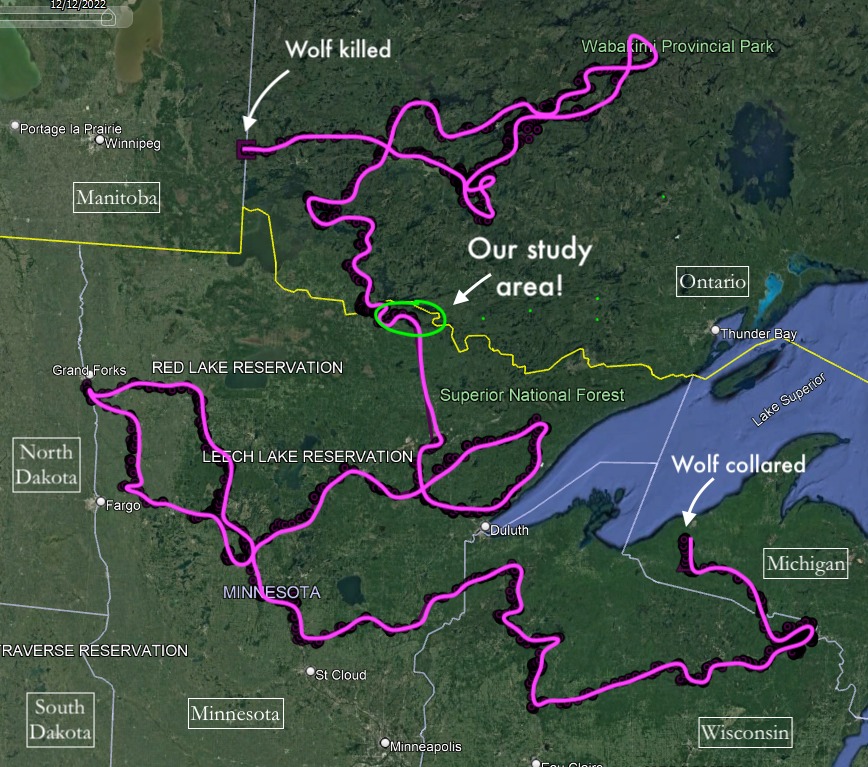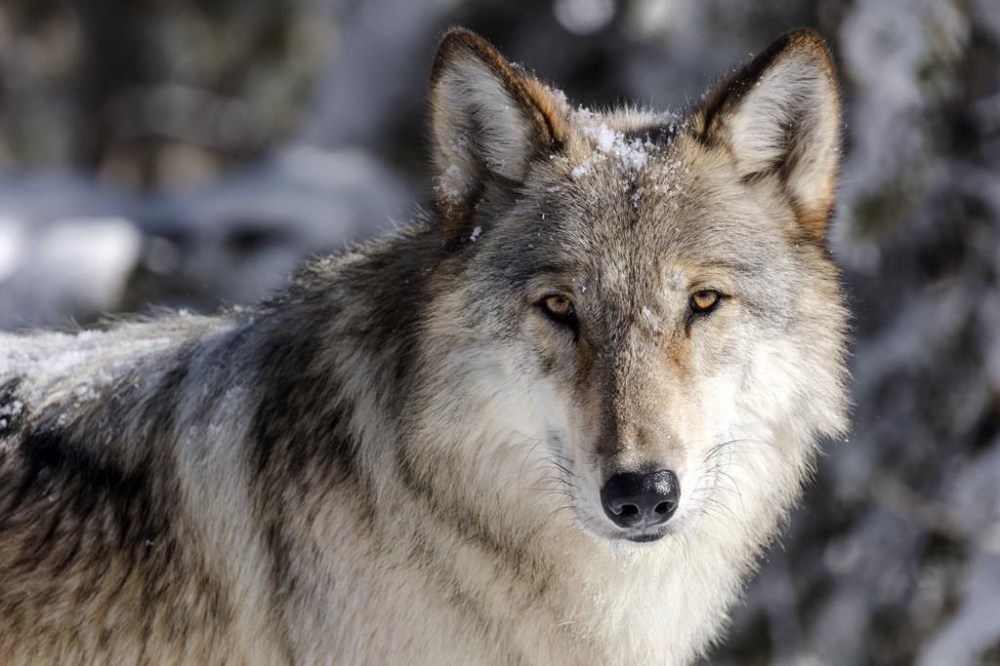Licence to kill: wolf hunt in crosshairs
Advertisement
Read this article for free:
or
Already have an account? Log in here »
To continue reading, please subscribe:
Monthly Digital Subscription
$0 for the first 4 weeks*
- Enjoy unlimited reading on winnipegfreepress.com
- Read the E-Edition, our digital replica newspaper
- Access News Break, our award-winning app
- Play interactive puzzles
*No charge for 4 weeks then price increases to the regular rate of $19.00 plus GST every four weeks. Offer available to new and qualified returning subscribers only. Cancel any time.
Monthly Digital Subscription
$4.75/week*
- Enjoy unlimited reading on winnipegfreepress.com
- Read the E-Edition, our digital replica newspaper
- Access News Break, our award-winning app
- Play interactive puzzles
*Billed as $19 plus GST every four weeks. Cancel any time.
To continue reading, please subscribe:
Add Free Press access to your Brandon Sun subscription for only an additional
$1 for the first 4 weeks*
*Your next subscription payment will increase by $1.00 and you will be charged $16.99 plus GST for four weeks. After four weeks, your payment will increase to $23.99 plus GST every four weeks.
Read unlimited articles for free today:
or
Already have an account? Log in here »
Hey there, time traveller!
This article was published 09/01/2023 (1067 days ago), so information in it may no longer be current.
Wolves are a beautiful animal that should be protected under Manitoba law, animal rights activists say.
“They are hunted for fun, for sport, and for their fur. No one eats wolf meat,” said Camille Labchuk, an animal rights lawyer and executive director of Animal Justice.
In the United States, wolves are an endangered species and are off limits to hunters.
Labchuk said wolf hunting should be banned in Canada, except when its done by Indigenous people.
A photograph of a hunter posing with a dead wolf, which was shown in the Free Press last week, was heavily criticized by readers.
Labchuk was sad to hear the wolf, which had a GPS tracking collar attached to it in Michigan — showing it had roamed through Minnesota, Wisconsin, North Dakota, and Ontario — was shot in Manitoba last month.

“It’s really tragic,” she said. “It’s a great question why governments, and some (people) still want to hunt wolves. We know the numbers have been decimated from what it was years ago.”
She said the hunting lobby, which is closely related to the gun lobby, is strong in Canada.
“When you look at the polls, people are very opposed to trophy hunting.”
But not everyone.
Wolves ‘highly abundant’: wildlife federation
Chris Heald, a senior policy adviser with the Manitoba Wildlife Federation, said wolves are abundant in Manitoba and are known to destroy livestock and big game.
“Wolves are doing damage to moose and elk populations, so First Nations are extremely upset we aren’t doing more,” Heald said. “First Nations would like to see culls (and) there are lots of cattle claims and losses.”
Heald said few people hunt wolves.
There are so many of them that a few years ago, the NDP government offered a financial incentive to trappers to target wolves and even brought in experts from Alberta to tell them how to do it.
Manitoba doesn’t track its wolf population.
“Wolf populations are monitored via feedback received from conservation officers, wildlife biologists as well as community meetings with Indigenous and non-Indigenous trappers, hunters and cattle producers,” a provincial spokeswoman said.
“Provincial staff report that wolf sightings and wolf encounters have been increasing in the last 10 or 15 years across much of the province.
“All indications are that wolves are highly abundant, possibly historically high in many areas.”
50 to 60 wolves hunted, trapped annually
Fewer than 40 wolves are killed by Manitoba hunters annually. On average, non-residents shoot fewer than 10 of them.
The province says another 20 wolves on average, which have killed livestock, are trapped annually. About 500 livestock have been killed or injured by wolves annually in the last five years.
Minnesota, which bans wolf hunting, does track the population.

Dan Stark, the large carnivore specialist with the Minnesota natural resources department, said there are about 2,700 wolves in the northern part of the state.
“Wolves are currently protected in Minnesota under the federal endangered species act which doesn’t allow hunting,” Stark said. “The legal status applies based on where wolves are, not their primary or home location.
“One side of the border they are legal game, the other they’re not.”
“One side of the border they are legal game, the other they’re not.”–Dan Stark
Stark said wolves received protection in the 1970s when there were only 1,000 wolves in the lower 48 states, the vast majority in Minnesota, and a few others on an island in Lake Superior.
The wolf population has rebounded and has spread as far as California.
Stark said there have been efforts to allow hunting in the past two decades; wolves were removed from the endangered species list, but legal action reversed those measures.
He said hunting was allowed in Minnesota as recently as 2021 when wolves were taken off the list, but a court decision last year reinstated their endangered status. The court decision is under appeal.
“The wolf population here is stable and pretty resilient,” Stark said. “We could have a regulated hunting season and manage it like other species in Minnesota.”
He said the government is tracking about a dozen wolves with GPS collars; none is in Manitoba.
Hunting has ‘complex’ impact on wolf pack
Sean Johnson-Bice, a PhD student at the University of Manitoba, studies arctic and red foxes and used to work with the Voyageurs Wolf Project in Minnesota.
“When it comes to wolf hunting, you have to separate it into political and ecological views,” Johnson-Bice said.
“Can the wolf population be hunted? Yes, that’s the approach Manitoba takes. A wolf population in the 25 to 35 per cent of their population can be hunted annually. They have large litters and can compensate.”
Johnson-Bice pointed out Canada has more open space and wilderness than the U.S.
“They have fully recovered their territory from British Columbia to Newfoundland and to the high Arctic. They don’t need the type of protection they have in the United States because the populations are healthy.”
He said while hunting might not hurt the overall wolf population, it can take a toll on a wolf pack.
“Some research shows when an animal is hunted from a pack, there could be pack instability and the pack could turn over or cease to exist altogether,” Johnson-Bice said.
“The effect can be more complex than you think.”
It’s also a matter of money: hunting provides millions to Manitoba’s tourism economy.
Graham Neale, executive director of the Manitoba Lodges and Outfitters Association, said most people who stay at a lodge and spend money are from other countries, including the U.S.
He emphasized they are subject to limits.
“It’s important to point out everybody in the hunting community are conservationists, too,” Neale said. “They hunt in a regulatory landscape, but they protect the resource, too. If they didn’t, they wouldn’t exist.”
Neale said his members are bound by hunting allocations imposed by the province.
If a hunter, who stays at a Manitoba lodge, returns home empty-handed, that’s OK.
“People come to Manitoba for the Manitoba experience. It’s more about the experience than the hunt… just like with fishing. They don’t call it catching.”
kevin.rollason@freepress.mb.ca

Kevin Rollason is one of the more versatile reporters at the Winnipeg Free Press. Whether it is covering city hall, the law courts, or general reporting, Rollason can be counted on to not only answer the 5 Ws — Who, What, When, Where and Why — but to do it in an interesting and accessible way for readers.
Our newsroom depends on a growing audience of readers to power our journalism. If you are not a paid reader, please consider becoming a subscriber.
Our newsroom depends on its audience of readers to power our journalism. Thank you for your support.
History
Updated on Monday, January 9, 2023 7:47 AM CST: Adds tile photo
Updated on Monday, January 9, 2023 8:12 AM CST: Fixes cutline
Updated on Monday, January 9, 2023 10:17 AM CST: Minor copy editing changes
Updated on Monday, January 9, 2023 11:27 AM CST: Adds images, formatting


